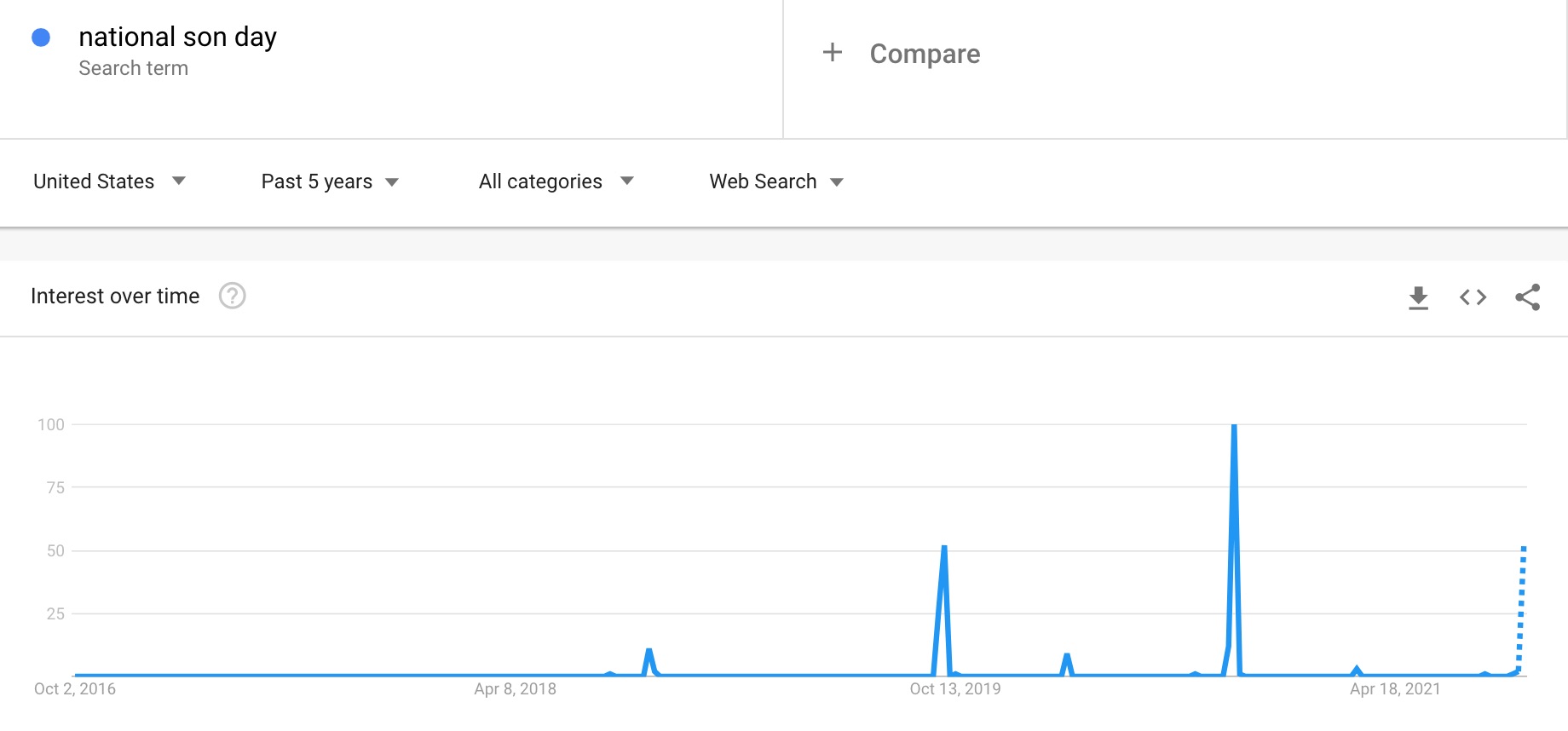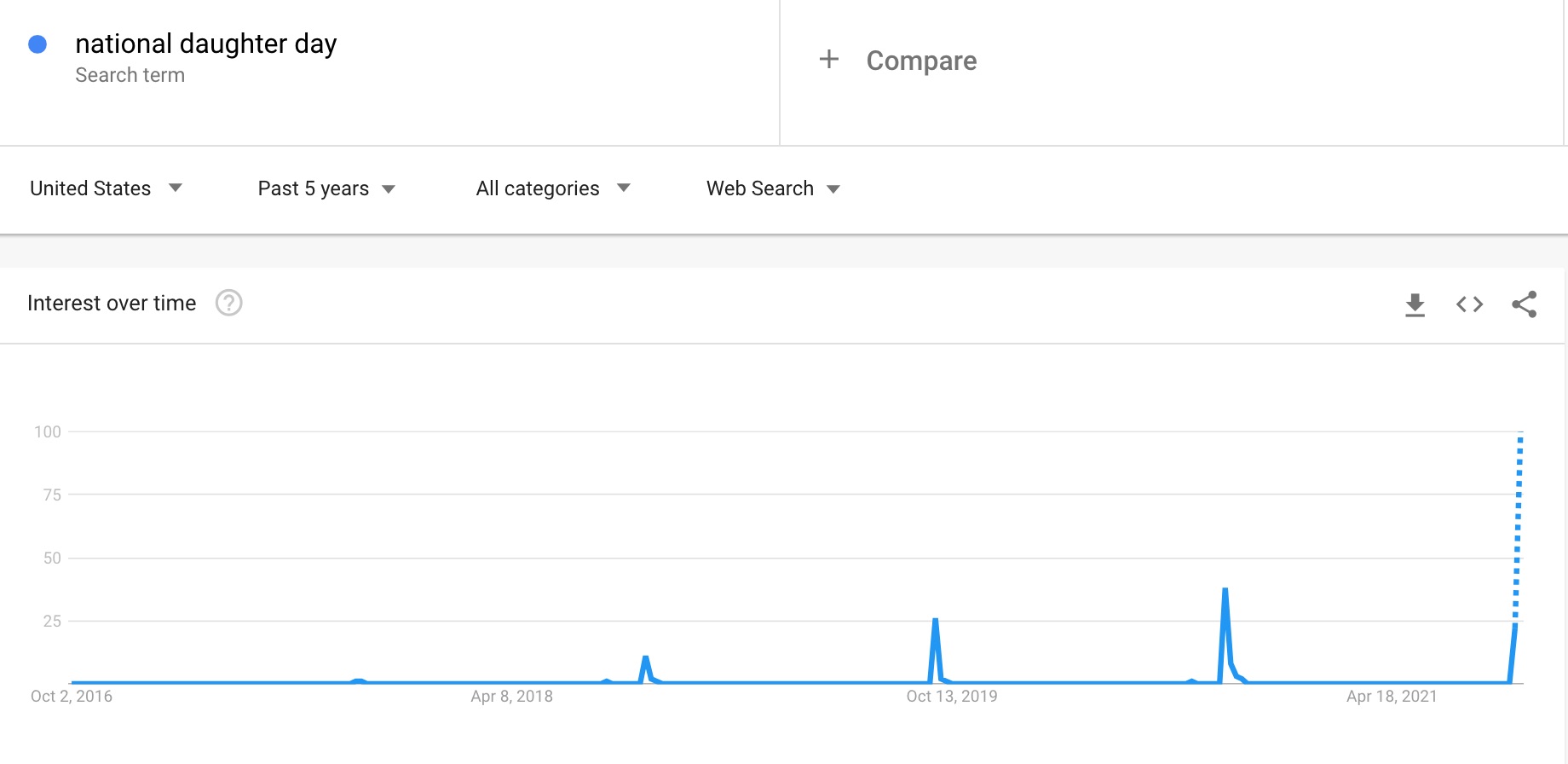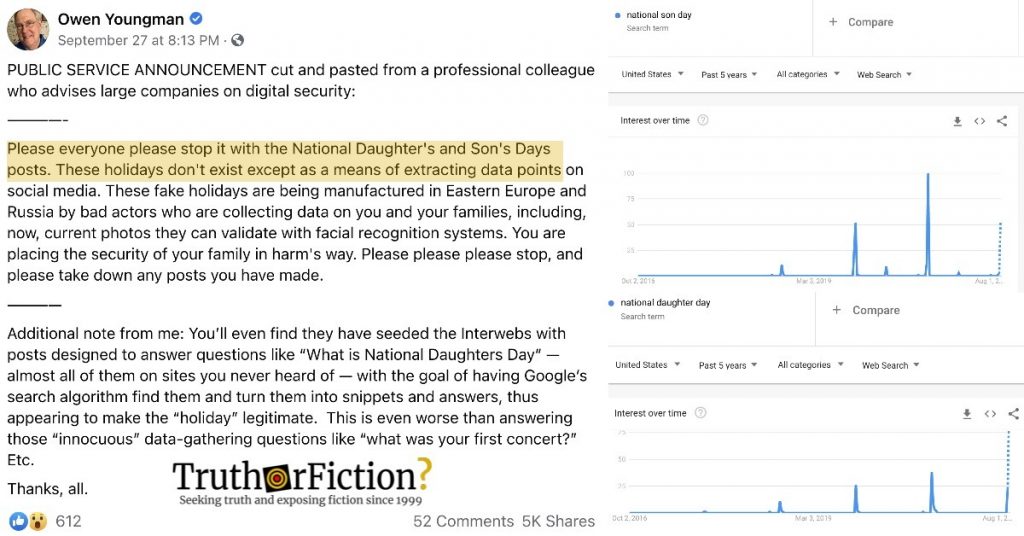On September 27 2021, Facebook user Owen Youngman posted about “National Son’s Day” and “National Daughter’s Day,” two purported “National Days” prompting significant social media engagement.
Youngman’s post encompassed two distinct topics we have addressed in recent fact checks:
PUBLIC SERVICE ANNOUNCEMENT cut and pasted from a professional colleague who advises large companies on digital security:
————-
Please everyone please stop it with the National Daughter’s and Son’s Days posts. These holidays don’t exist except as a means of extracting data points on social media. These fake holidays are being manufactured in Eastern Europe and Russia by bad actors who are collecting data on you and your families, including, now, current photos they can validate with facial recognition systems. You are placing the security of your family in harm’s way. Please please please stop, and please take down any posts you have made.
————
Additional note from me: You’ll even find they have seeded the Interwebs with posts designed to answer questions like “What is National Daughters Day” — almost all of them on sites you never heard of — with the goal of having Google’s search algorithm find them and turn them into snippets and answers, thus appearing to make the “holiday” legitimate. This is even worse than answering those “innocuous” data-gathering questions like “what was your first concert?” Etc.Thanks, all.
Broadly, discourse over the sudden emergence of “National Son/Daughter Day” followed, such as a screenshot of the following tweet shared to Facebook on September 29 2021:
Two elements in the post appeared in two then-recent fact checks — the first pertaining to a September 2021 Facebook post by actor Wil Wheaton. In that warning, Wheaton discussed Facebook data mining and “viral” question posts:
Another fact check concerned the fairly modern influx of “National Days,” which came to issue after a viral social media post mentioned “National Kool-Aid Day”:
In it, we explained that “National ‘X’ Day” appeared to be a fairly new phenomenon, one that has not gone entirely without notice:
In 2019, The Atlantic attempted to explain the social media prevalence of “National Days,” and the seemingly non-stop barrage of novel and informal quasi-holidays on sites like Twitter. That article was titled “The Devastating Truth About National Avocado Day,” subtitled “Why millions of people are extremely eager to celebrate fake holidays sponsored by corporations” …
Youngman said that National Son’s Day and National Daughter’s Day “don’t exist except as a means of extracting data”; our page about National Days explains that it is also a racket for National Day calendar sites as well as a means for brands to get free publicity. Youngman added that bad actors had “seeded” the internet with ad hoc content validating “National Son’s Day” and “National Daughter’s Day.”
When we did searches for “National Son’s Day” and “National Daughter’s Day” respectively, we sought to test Youngman’s claims by restricting results to anything published on or before September 1 2014. Both returned extremely scant results (as few as 38 results), with many misdated and fairly recent entries among those few links.
Google Trends data dating back five years for “National Son[‘s] Day” seemed to register virtually no searches until late September 2019, as was the case with National Daughter[‘s] Day”:


On our September 2021 fact check about data mining posts on Facebook, we explained that a lack of transparency on the part of social media platforms and bad actors meant that it was difficult to assign motives to the newly viral holidays in question — but that we’ve always cautioned against interacting with engagement bait:
We know that Facebook’s algorithms govern what we do and do not see, and that those algorithms are both ever-changing and secretive. By design, we cannot definitively say the claims about engagement are true — but we can say that anecdotally, readers report seeing an increase in random question-based posts — from entities like obscure radio stations — as of September 2021.
We have long advised avoiding engagement bait regardless of direct risk. Engagement bait is rarely valuable, and it can easily be exploited in a number of ways.
Youngman said that “National Daughter’s and Son’s Days” didn’t exist, and were used by “bad actors” to gather data. While it’s difficult to say why National Son’s Day and National Daughter’s Day emerged so suddenly, we can say that both “national days” didn’t seem to exist until September 2019. At best, the hashtags and posts were engagement bait, and at worst, an easy way for data miners to hone in on specific information.
- National Son's Day, National Daughter's Day, Facebook Data Mining | Facebook
- National Son's Day, National Daughter's Day, Facebook Data Mining | Facebook
- Wil Wheaton Facebook Data Mining
- National Kool Aid Day 2021 and Mike Lindell’s ‘Trump Return’ Claim
- National Son's Day | Google Search
- National Daughter's Day | Google Search
- National Son's Day | Google Trends
- National Daughter's Day | Google Trends
- "You’re just going to have to trust me that I love my kids…I can’t keep up with y’all’s made up holidays." | Facebook
- "You’re just going to have to trust me that I love my kids…I can’t keep up with y’all’s made up holidays." | Derek Simpson/Twitter

